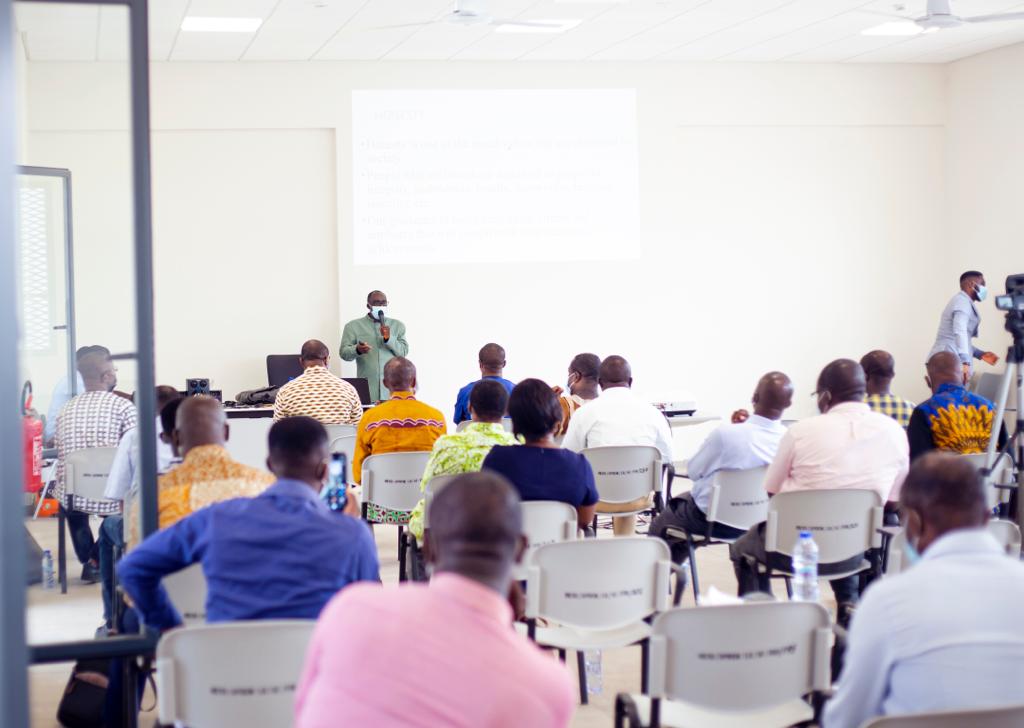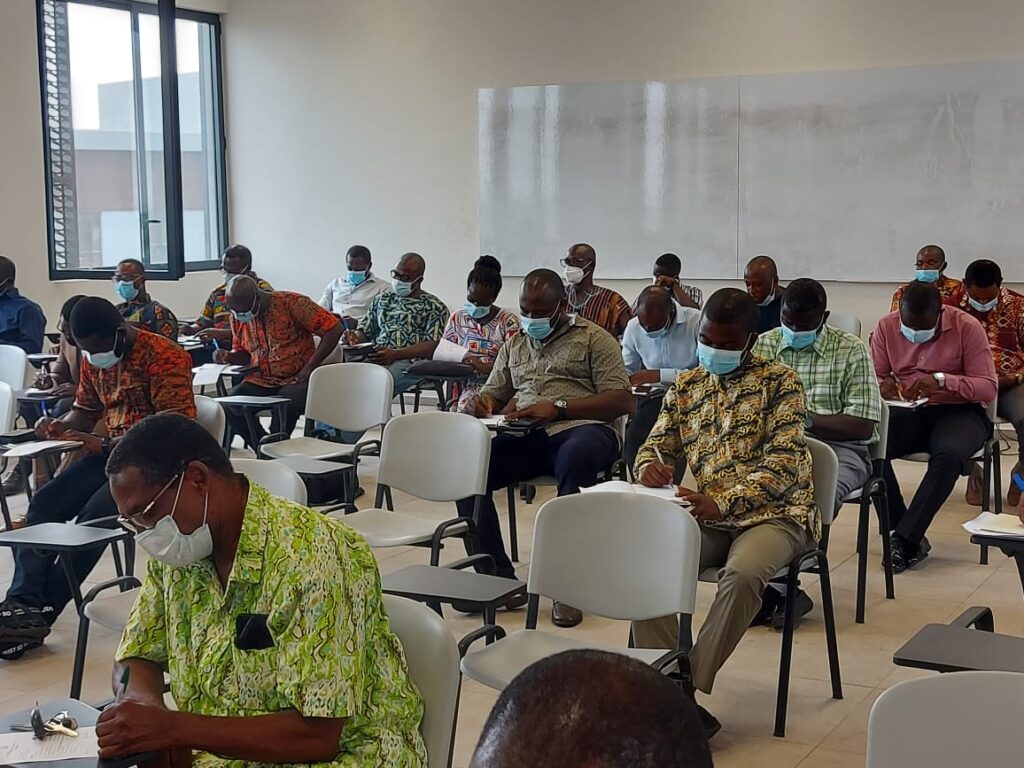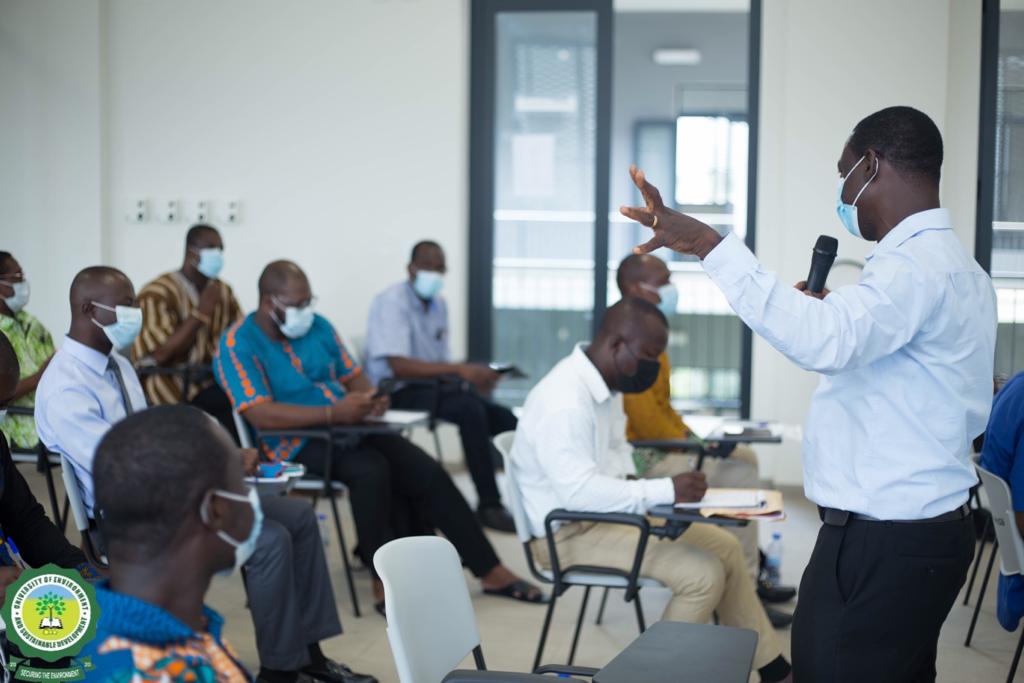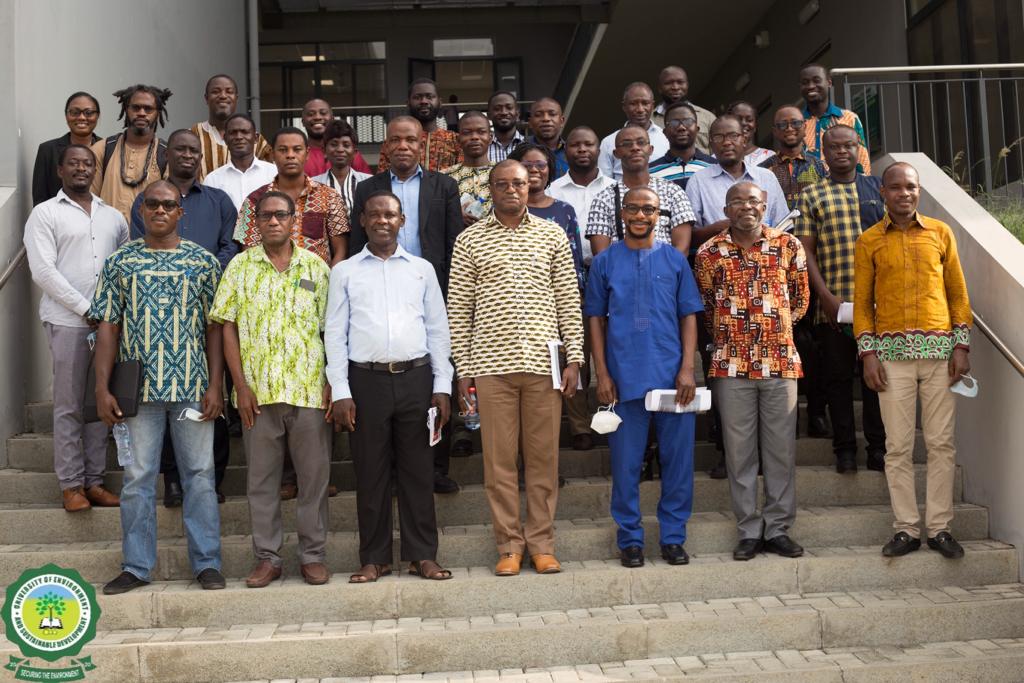The University of Environment and Sustainable Development, (UESD) HOPE Roadshow Committee has started a series of activities to execute its maiden programmes lined up for the 2021/22 Academic Year to advance the core values of the University.
The Committee, chaired by Dr. Michael Odame, of the School of Sustainable Development, was inaugurated in November last year 2021 by Prof. Nyarko-Sampson to outline a Road Show that will instil the core values of the University, that is Honesty, Opportunity, Perseverance and Enterprising “HOPE” in the students and members of staff.

The HOPE Road show is part of the ‘strategic’ vision of Prof. Nyarko-Sampson as the Vice-Chancellor of the UESD.
The two-week programme which started on the 12th of January, 2022 will end on the 28th of January, 2022. The activities for the period include workshops for Senior Members, (teaching and non-teaching) Senior and Junior Staff, as well as a conference for students.
The first in the series of workshops for Senior Members in the Teaching category was facilitated by two renowned Professors from the University of Cape Coast, UCC: Rev. Prof. Seth Asare-Danso, the Head of the School of Religious and Moral Education and Prof. Yiadom Marfo, the Head of the Department of Accounting.
Speaking on the topic: “Incorporating H.O.P.E. in Curriculum Planning,” Rev. Prof. Seth Asare-Danso, underscored the need for the Senior Members to be abreast of the 21st Century skills, so that their students will be able to fit into the global competitive environment, which continue to change by the day.

He listed the 21st Century skills to include; critical thinking, communication skills, collaboration and teamwork as well as personal and social skills.
He indicated that these skills are associated with expertise such as analytical, problem solving, decision making, reasoning, social media, innovation, identifying alternatives, citizenship, cultural awareness and management of tasks including oneself.
Prof. Asare-Danso told the Lecturers that in planning and developing their Curriculum, they would have to incorporate the 21st Century skills and the core values (H.O.P.E.) of the University into it.
Touching on the first letter ‘H’ of the Core Values which represents Honesty, Rev. Prof. Asare-Danso said, by ensuring that Lecturers provide all the necessary information concerning their course outline and judiciously following the timelines on topics to be taught, organizing quizzes, working on intra-semester assessments and the end of semester examinations, a sense of trust and honesty is built in the sub-conscious of the students. This, he believes will go a long way to teach the students to follow through promises and agreements made.
On Opportunity, Prof. Asare-Danso said, Lecturers should make conscious efforts to create opportunities for students to freely express themselves to realise their potential. The “opportunity” may be created equally or equitably based on the student’s strengths and weakness. He explained that affording these opportunities will help the students to be the best of themselves.
With regard to the issue of Perseverance, Rev. Prof. Asare-Danso, urged Lecturers to inspire their students to understand that failure is a process, not the outcome. They should consider failure as a learning experience which adds to their knowledge.

He said, one of the ways to encourage UESD students to be Enterprising, is by ensuring that they are given assignments that are challenging and involve critical thinking. He explained this will help them to always think outside the box and come out with innovative ideas that will be needed to help in the country’s fight to sustain the environment. Answering a question on the fear of students not to be honest during situations where there were no invigilators and cameras, Prof. Asare-Danso, said, such guarantees may be given when students are made to understand the importance of being honest rather than requiring them to be honest without any conviction.
The second speaker, Prof. Edward Marfo-Yiadom, spoke on:” Leadership by Example (Exhibiting H.O.P.E)”. Prof. Marfo-Yiadom said, a typical University setting executes three major functions; teaching, research/publication and service-outreach-extension. “Teaching and assessment, usually requires the Lecturer to be punctual, discuss course outline with students, establish general rules in line with institutional policies on attendance, assessment and plagiarism.”
He said a Lecturer who plagiarizes indirectly teaches students to be dishonest. Hence; the need for Lecturers to always ensure that appropriate procedures are followed to avoid academic dishonesty. Prof. Marfo-Yiadom said, Lecturers are also required to systematically deliver Lecture topics and also follow policies of registration of courses and comply also with deadlines set by the Academic Board or anybody in that regard.
With research and publications, Prof. Marfo-Yiadom said, Lecturers are required to supervise students’ projects and also supervise their own research while ensuring that contributions of students who assist them in such personal research projects are duly acknowledged.
He reminded the Lecturers of their obligation to offer institutional support to the University in relation to annual research funds utilization and also to contribute to the organization of workshops, seminars and conferences. He said Lecturers can also contribute to the University journals.
Prof Marfo-Yiadom indicated that in integrating UESD’s core values (H.O.P.E.) into academic activities, Lecturers shall, ‘lead by example.’ This he believes will ultimately influence the students after graduation. He said, Lecturers should perform their functions in a manner that conforms strictly to all institutional policies, make lecture periods productive by ensuring that topics are covered well, provide quick feedback on assessment so that students do not lose confidence in the system and also follow appropriate grade appeal procedures.
He advised the Lecturers to hold regular meetings with staff and students to ensure that they are keeping with the HOPE ideals.
The Chairman for the sessions, Prof. Eric Nyarko-Sampson, in his remarks, revealed that the HOPE. Roadshow and the H.O.P.E. agenda was realized based on the several affirmations received from both teaching and non-teaching staff.
He encouraged the Senior Members to approach the HOPE agenda with all seriousness in a bid to assist the University train graduates who can be entrusted with the future of the country in relation to environmental development and sustainability.
The Chairman of the H.O.P.E. Roadshow Committee, Dr. Michael Odame, promised a rewarding experience for participants during the two-week Roadshow.

